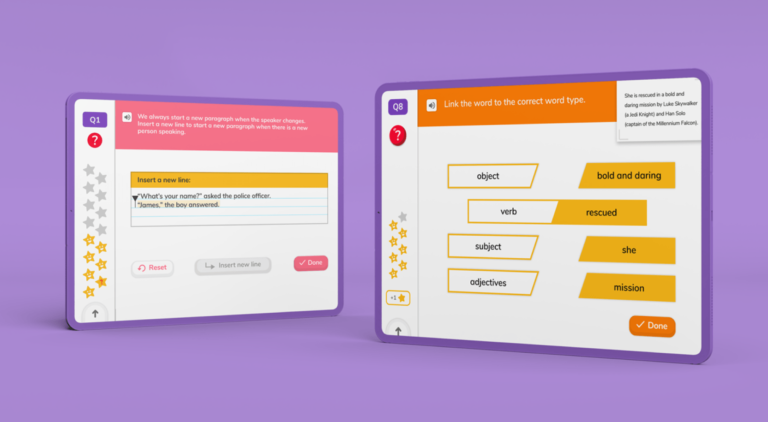Key takeaways
The KS1 reading SATs are part of a wider range of KS1 SATs which are assessments students will undertake at the end of Year 2. As Year 2 marks the final year of the Key Stage 1 national curriculum, these assessments are designed to assess each learner’s knowledge and understanding before they move on to the Key Stage 2 curriculum.
As of 2024 the Year 2 reading SATs papers, as with all KS1 SATs are completely optional assessments. This means that each individual school will decide whether they’d like their Year 2 students to take part in these or not.
If your child’s school is having their pupils sit these assessments, then it can be helpful to have an understanding of what they’ll be assessed on, and when.
We’ve created this guide on the KS1 reading SATs as part of a wider series on the KS1 SATs to take a closer look at what these assessments will look like and what the results mean for learners.
There are two SATs reading KS1 papers that Year 2 students can sit if their school is going ahead with the KS1 SATs.
Both of these papers focus on learners’ reading and comprehension abilities but just have slightly different formats. In each, students will read two texts and answer questions worth a total of 20 marks.
In paper 1, students will have a combined reading and answer booklet. On each page, there will be a small section of text with a few corresponding questions below.
In paper 2, there are separate reading and answer booklets, which will further test pupils’ ability to find relevant information in a larger piece of text.
Across both papers, the questions will be a mixture of short answer and multiple choice option answers. These questions will increase in difficulty as learners progress through the papers.
Following the decision to make the KS1 SATs optional, these assessments are no longer strictly timed. As a guide, paper 1 should take students around 30 minutes and paper 2 should be around 40 minutes to complete.
Teachers are encouraged to use their own judgment on these times and allow extra time if and when they see fit for their individual students.
Unlock unlimited SATs practice
Put your skills to the test with fun exercises + learning games that are proven to boost ability!
Looking for more SATs practice? DoodleLearning is an award-winning maths and English app that’s filled with thousands of questions and games aligned to the national curriculum!
Designed by teachers, it creates each child a unique work programme tailored to their needs, doubling their progression with just 10 minutes of use a day. Try it for free!


Each KS1 sats reading paper is marked out of a total of 20 marks, meaning that there are a total of 40 marks that can be achieved. These raw scores are then converted into a scaled score using this table.
The scaled score is the score that schools will use in order to determine if students are working at the expected level for their stage or if they’ll require some additional support.
The minimum score a learner can receive is 85 and the highest score is 115. A score of 99 or less indicates that a child would benefit from some extra support as they move into Year 3 and start their journey on the Key Stage 2 curriculum.
It’s also worth noting that as the KS1 SATs are now optional assessments, schools do not need to report students’ scores to either parents or local authorities. You may still find that schools choose to include them in an end-of-year report for your learner.
If your little one’s school is opting to have their Year 2 students take the KS1 SATs then you might feel you’d like your learner to do a bit of prep work in the run-up to May!
With younger students, the key to preparing for their SATs is little and often. Sitting down to complete past papers or practice papers straight away can be a little overwhelming and your kiddos will probably lose focus – especially after a long day at school!
We love this 10-minute test book available at Amazon. The activities are the perfect length to get your learners some targeted revision through various reading comprehension activities.
Another fantastic resource that your Year 2 learners will love is our DoodleLearning reading app! The app is packed full of fun games and activities that are all fully aligned with the national curriculum.
Learners will get a fully personalised programme of activities that’ll boost their confidence and ensure they’re covering the skills they need for their SATs and beyond!
As May approaches and the SATs are closer, you could then try out a few of these longer practice papers with them too as well as some KS1 reading SATs past papers!
DoodleEnglish is the perfect study companion for KS1 English SATs. Filled with thousands of reading, grammar, spelling, and punctuation exercises aligned to the national curriculum, 5 minutes of practice a day can improve reading and comprehension skills!


Past papers are a super way to prepare your learners for their upcoming KS1 SATs. Not only are they a good way to revise essential concepts and reading skills, but they’re also the best way for students to become comfortable with the format of the test.
The previous three years of official KS1 SATs reading papers and English grammar, punctuation and spelling papers are available to download and print for free, including a handy marking scheme and other supporting documents.
There is no need to stress out ahead of the KS1 SATs! By taking on a few of the preparation strategies we’ve outlined above, learners can build their confidence and be ready to take on these assessments!
Remember, these optional assessments are simply a way for schools to get an idea of how best to support their students as they move into Year 3 and start the Key Stage 2 curriculum. This ensures that they’re in the best position as they move through the rest of their primary school journeys.
For more information on all the different exams that Year 2 learners will sit through the KS1 SATs, be sure to check out our other guides, including KS1 maths SATs!
If you’re a Year 2 teacher, we know that the prospect of the KS1 SATs can be quite stressful. If you’re a Year 2 teacher, then be sure to take a look at our guide on how to avoid SAT stress too!
The KS1 reading SATs usually take place in May each year. As these assessments are optional, there is no strict timetable and schools are able to arrange the papers as they decide best.
The guide time for the KS1 SATs reading papers are 30 minutes for paper 1 and 40 minutes for paper 2. However, since these SATs are no longer statutory requirements and are now optional assessments, the tests do not need to be strictly timed.
The Year 2 reading SATs papers are not viewed as ‘pass’ or ‘fail’ assessments, and so the scoring reflects this. Their raw marks from their reading papers will be converted into a scaled score of between 85 and 115.
These scaled scores are then used to determine if they’ll require any additional support as they move into Year 3 and start the Key Stage 2 curriculum. If your learner scores less than 99, then they may require some extra support moving forward.
Lesson credits

Mhairi Sim
Mhairi is an experienced teacher, freelance writer and parent. After completing her bachelor's degree in Psychology, she graduated as a teacher from the University of Strathclyde. She then built experience teaching across KS1 and KS2 throughout the UK. In addition to working in mainstream education, Mhairi specialised in the additional support needs sector, including social, emotional, and behavioural support.

Mhairi
Mhairi is an experienced teacher, freelance writer and parent. After completing her bachelor's degree in Psychology, she graduated as a teacher from the University of Strathclyde. She then built experience teaching across KS1 and KS2 throughout the UK. In addition to working in mainstream education, Mhairi specialised in the additional support needs sector, including social, emotional, and behavioural support.
Book a chat with our team
If you’d like to use Doodle’s browser version, please visit this page on a desktop.
To log in to Doodle on this device, you can do so through our apps. You can find out how to download them here: